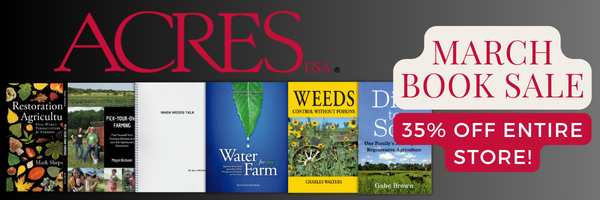Who’s following behind you?
In 2030, when my granddaughter turns 13, our farm will have been in our family for 200 years. Caroline is the ninth generation to live on this farm. That seems to me to be quite an accomplishment.
This farm has gone through so many evolutions over the years. When my fourth great grandfather, Valentine Darnall, came to Illinois in 1830, he had to figure out his way to make a sustainable living for his family — as has each subsequent generation. Throughout the history of this farm, I am sure that has not been an easy task. Surviving the depression of the 1930s, the changes in equipment, and the passing on to the next generation — all have had their challenges.
There is one thing that I have noticed, though: all the grandmothers have come from somewhere else. By that I mean that they all married into this family and brought with them their own identities and passions. When the husbands passed away, many times it was the grandmothers who then had to keep it together and make hard decisions about what was best for the farm and for the family. It has been no different in my generation, or in my son Will’s.
Will and his family now live on the farm in the “big house.” With that comes lots of responsibility and commitment as the caretaker for this generation, including taking care of buildings and the upkeep of the yard and land. When Will was 10 years old, we asked him one evening what he wanted to do with his life. He said he wanted to work in the woodshop with me, make maple syrup and take care of this farm. We didn’t get to spend a lot of time working at furniture building together — at least not as much as I had hoped — but he has nailed the other two!
Working with family can be one of the most rewarding aspects of the family farm experience. For some, though, it is one of the most frustrating aspects of farming. A number of people have told me that they wished their parents would just allow them to work on their dream on a tiny fraction of land. A few of those folks are in their mid-40s! What is the wait about?
From the beginning here at our farm, Kris, Will and I envisioned together what we wanted the farm to evolve into in our time. Kris has been the real driver, with the passion, foresight and legal mechanics. We each played an important role in working to achieve the desired outcomes. Will is mechanically minded, loves the history of the farm and loves working with the animals — especially the cows. I tend to be the one always looking for the latest and greatest crop or opportunity. I try to stay ahead of the pack that way, working to make connections and marketing the farm in specific ways. Kris continues to be the accounts manager and keeps us solvent. We work well as a team, benefitting each other and also the larger farmers’ group, Down at the Farms, LLC, for which we do the marketing and delivery. It takes a team to do this. It takes support and a belief that you can do it together.
Having family involved is something that I think is hugely rewarding. There is a sense that working together is far less about accomplishments — although those are important — than about the quality of time spent and the uplifting of each person. Each of us has our visions or ideas of how to go about something. But sometimes it takes all our eyes and ears on a project to understand that there could be multiple paths to an end. Listening to each other’s ideas is vital. Creating an environment that allows each partner to be heard and respected is key to making everyone happy.
As time has gone on, we three have found our own unique positions within the farm. With Will and I — mostly Will — being “on the farm,” we have divvied up our roles. We still make lots of joint decisions, but I continue to encourage him to make more of his own choices. He is more than capable, and I believe in him. Since he’s the person living there, he takes on more responsibility for animal chores — and if he doesn’t want to move around the pastured hogs, then so be it. I certainly don’t want to burn him out or make him and his family feel like they have to do such and such. It is their turn to accept the responsibility and to do so with the passion that they feel. That doesn’t mean that I take the back seat on every ride, but I don’t have to be the driver. This gives the next generation the opportunity to express their views and to potentially fail better too!
From the time Will was in high school, Kris and I made him a third partner in the farm. We took all the farm’s income and split it four ways: one fourth to Kris, Marty and Will and one fourth stayed for the farm. That helped to cover any of the farm’s expenses. We each shared in the abundance — or lack thereof! We also didn’t make it such that Will was just getting an allowance. He was a partner. He had a voice.
As we have increased in our scope as a farm, and as a marketing and delivery service. Will has continued to expand his knowledge and participation in all aspects of the operation. He can make calls, order equipment or talk with prospective farmers. We have a respect and a trust with each other that allows that to happen daily. We continue to pass the torch, but we aren’t dumping it on him all at once.
I think working with younger children offers similar opportunities by allowing them to pick and choose things that interest them — by giving them a say in what to grow or what to sell, or even what to eat! Engaging them at every turn is important if you expect them to follow in your footsteps. It is a delicate balance! Also, everything is not about the work. Have some fun. It’s a farm, so take time to go exploring or to enjoy early morning or evening walks. Yes, you need to get things done, but remember to live too!
Besides thinking about who’s following behind, think about who has led the way for you. Don’t shut out the grandparents or other seasoned family members, or even brothers, sisters and cousins. There is so much knowledge and experience that resides in each of them. Utilize, encourage and actively nurture those relationships. You may need them, and they might also need to be connected to your farm. Allowing their pride to shine is an integral part of the story. Their sphere of influence is different than yours, and their connections and what they know may prove helpful at some point. Additionally, sometimes several extra hands go a long way!
There are some interesting statistics coming out that indicate there could be a major shift in family farmland coming up. As the current farmers continue to age and retire, their children or heirs appear to have a different point of view as to what the family farm should be going forward. I have read numerous articles about sons and daughters in their forties taking ownership of the family farm and not wishing it to be a place for growing conventional crops, at least not on the large scale. Small-scale farming, especially by women, seems to be the fastest growing sector of agriculture currently.
So many of us are coming from non-farming backgrounds. How in the world can we take this on? Folks in their fifties are often very successful in their encore careers and are inclined to do more in the way of community building and work that resonates with their sense of purpose. Farming offers that too!
To that end, I hope that all these words ring true with you. Utilize all the tools you have at your disposal. Most of all, share your vision with your family.
“Sustainability is ultimately an ethical issue. There is no economic reason to do anything for someone of some future generation other than it is the right thing to do. We owe a debt to those of the past who created the opportunities that we have today, and we can only repay that debt to people of the future.”
— Dr. John Ikerd, from the documentary Sustainable.
Marty Travis is a seventh-generation farmer at Spence Farm in Fairbury, Illinois. He runs a co-op that markets the products of over a hundred small farms to chefs in Chicago and throughout the state. Marty is the author of My Farmer, My Customer, published by Acres U.S.A.














